-
 Bitcoin
Bitcoin $76,444.7530
-3.77% -
 Ethereum
Ethereum $1,473.8355
-5.46% -
 Tether USDt
Tether USDt $0.9991
-0.08% -
 XRP
XRP $1.7965
-5.51% -
 BNB
BNB $553.4919
-0.36% -
 USDC
USDC $0.9999
-0.02% -
 Solana
Solana $105.2981
-1.74% -
 TRON
TRON $0.2303
0.81% -
 Dogecoin
Dogecoin $0.1422
-4.62% -
 Cardano
Cardano $0.5587
-4.41% -
 UNUS SED LEO
UNUS SED LEO $8.9866
1.01% -
 Toncoin
Toncoin $2.9933
-4.74% -
 Chainlink
Chainlink $10.9113
-4.81% -
 Stellar
Stellar $0.2215
-4.76% -
 Avalanche
Avalanche $16.1163
-3.29% -
 Sui
Sui $1.9371
-3.89% -
 Shiba Inu
Shiba Inu $0.0...01065
-6.69% -
 Hedera
Hedera $0.1469
-3.29% -
 MANTRA
MANTRA $6.2058
-1.53% -
 Dai
Dai $1.0000
0.01% -
 Bitcoin Cash
Bitcoin Cash $269.3457
-2.08% -
 Polkadot
Polkadot $3.3773
-5.87% -
 Litecoin
Litecoin $69.2204
-2.50% -
 Ethena USDe
Ethena USDe $0.9986
-0.01% -
 Bitget Token
Bitget Token $4.0180
-3.25% -
 Pi
Pi $0.5649
-4.50% -
 Hyperliquid
Hyperliquid $11.1928
-2.80% -
 Monero
Monero $195.3885
-4.41% -
 OKB
OKB $50.9235
-0.59% -
 Uniswap
Uniswap $4.7688
-6.95%
How to recycle mining equipment for FIL mining?
Repurposing or responsibly recycling obsolete Filecoin mining hardware requires assessing its value, exploring component reuse, identifying buyers or e-waste recyclers, and complying with relevant environmental and legal regulations.
Mar 20, 2025 at 11:42 am
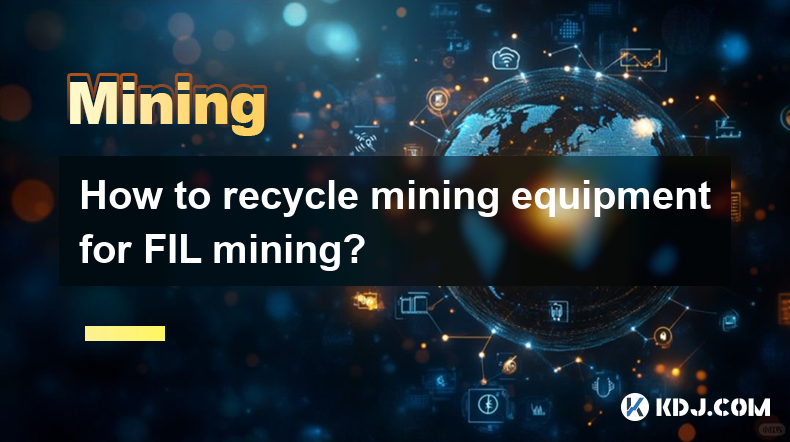
Key Points:
- Assessing the viability of repurposing FIL mining hardware.
- Identifying potential buyers or recycling programs for outdated equipment.
- Exploring options for component reuse or resale.
- Understanding the environmental impact and responsible disposal methods.
- Navigating legal and regulatory considerations surrounding e-waste.
How to Recycle Mining Equipment for FIL Mining?
Filecoin (FIL) mining, like other crypto mining activities, involves significant hardware investment. As technology advances and mining difficulty increases, older equipment becomes less profitable and eventually obsolete. This raises the crucial question of how to responsibly and potentially profitably recycle or repurpose this hardware. The process is multifaceted and requires careful consideration.
The first step is evaluating your equipment's condition and potential resale value. Factors influencing this include the age of the hardware, its processing power (hash rate), and its overall functionality. Newer, high-performance ASICs might fetch a better price on secondary markets than older, less efficient models. Thorough testing is crucial to accurately assess its functionality before attempting a sale.
If reselling isn't feasible, exploring options for repurposing components is worth considering. Certain components, like RAM, storage drives (SSDs or HDDs), and power supplies, may still be usable in other systems. These could be sold individually or used in personal projects, effectively extending their lifespan. This approach reduces waste and potentially yields some financial return.
Identifying potential buyers for your used FIL mining equipment is key. Online marketplaces specializing in used mining hardware, or even direct contact with mining farms seeking upgrades, can be effective avenues. Transparency regarding the equipment's specifications and performance is crucial to attract buyers and ensure a fair price. Be prepared to negotiate and be realistic about its market value.
Several companies specialize in recycling electronic waste (e-waste), including mining equipment. These firms often offer responsible disposal options that comply with environmental regulations. They can handle the dismantling and recycling of the hardware's various components, minimizing the environmental impact of discarded mining equipment. Research reputable e-waste recyclers in your area to find a suitable solution.
The environmental impact of discarded mining hardware is a significant concern. Improper disposal contributes to electronic waste, posing risks to human health and the environment. Responsible recycling practices help mitigate these risks. Choosing a certified recycler ensures your equipment is processed safely and sustainably, reducing the overall environmental footprint.
Legal and regulatory considerations vary depending on your location. Disposal of electronic waste is subject to specific laws and regulations, which differ across jurisdictions. It's essential to familiarize yourself with the relevant regulations in your region to ensure compliance. Non-compliance can result in significant penalties.
Data security is paramount when recycling or repurposing mining hardware. Ensure all sensitive data is securely erased before selling or disposing of the equipment. Using specialized data wiping software or physically destroying storage drives are recommended practices to prevent data breaches. This is crucial for maintaining data privacy and security.
The energy consumption of FIL mining equipment is substantial. Efficient energy management during the mining process is essential, and this should be considered even before equipment disposal. Reducing energy consumption throughout the equipment's lifecycle minimizes the environmental impact. Consider factors like power efficiency when choosing mining hardware initially.
The complexity of the mining hardware varies depending on the scale of the operation. Large-scale mining operations often employ specialized hardware and cooling systems, requiring more involved recycling processes. Smaller-scale operations might have simpler setups, making recycling relatively straightforward. The scale of operation influences the complexity of the recycling process.
Understanding the different types of FIL mining hardware is crucial. Different types of ASICs, GPUs, and other components have varying lifespans and recycling processes. Some components might be more valuable for resale or repurposing than others. Knowing your hardware's specific type will help you make informed decisions about its disposal or reuse.
Maintaining thorough records of your mining equipment, including purchase dates, models, and performance data, is crucial for tax purposes and for assessing its value during resale or recycling. Accurate documentation streamlines the process and assists in determining the appropriate disposal method. Good record-keeping is beneficial throughout the entire lifecycle of the equipment.
Frequently Asked Questions:
Q: Can I simply throw away my old FIL mining equipment?
A: No, disposing of e-waste improperly is illegal in many jurisdictions and environmentally harmful. It's crucial to recycle or responsibly dispose of your equipment through approved channels.
Q: What is the best way to sell used FIL mining equipment?
A: Online marketplaces specializing in used mining hardware, or contacting mining farms directly, are good options. Accurate descriptions and transparent disclosure of the equipment's condition are vital.
Q: Are there any tax implications for selling or recycling my mining equipment?
A: Yes, you should consult a tax professional to understand the tax implications of selling or disposing of your mining equipment, as it may affect your capital gains or losses.
Q: What if my equipment is beyond repair and has no resale value?
A: Contact a certified e-waste recycler. They will handle the responsible disposal of the components according to environmental regulations.
Q: How can I ensure data security when disposing of my mining hardware?
A: Use data wiping software or physically destroy storage drives to completely erase all data before selling or disposing of the equipment.
Disclaimer:info@kdj.com
The information provided is not trading advice. kdj.com does not assume any responsibility for any investments made based on the information provided in this article. Cryptocurrencies are highly volatile and it is highly recommended that you invest with caution after thorough research!
If you believe that the content used on this website infringes your copyright, please contact us immediately (info@kdj.com) and we will delete it promptly.
- "Cardano (ADA) Price Could Dip Below $0.60, Following Previous Market Cycle"
- 2025-04-09 05:10:12
- BONK, the well-known meme coin, has risen over 35% in the last week, attracting meme coin investors in the market. So, what caused this rally?
- 2025-04-09 05:10:12
- Bitcoin (BTC) Investors May Not Exactly Feel It, but BTC Has Been a Relatively Good Bet
- 2025-04-09 05:05:12
- Donald's Bitcoin (DONBTC) Could Turn Early Investors into Multi-Millionaires, Like Shiba Inu (SHIB) and Dogecoin (DOGE) Did
- 2025-04-09 05:05:12
- 6 Upcoming Kraken Listings That Could Be the Next Big Thing in Crypto
- 2025-04-09 05:00:13
- COTI Unveils New Privacy-Focused Blockchain to Reshape Web3 Transactions
- 2025-04-09 05:00:13
Related knowledge
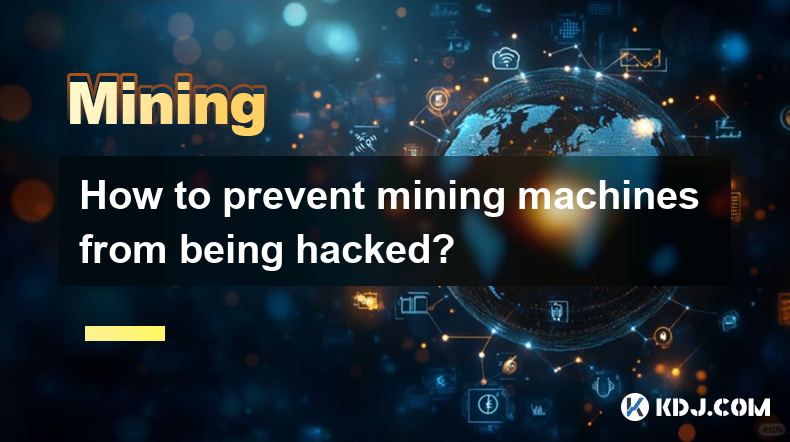
How to prevent mining machines from being hacked?
Apr 08,2025 at 09:00pm
In the world of cryptocurrency, mining machines play a crucial role in securing networks and validating transactions. However, these machines are also prime targets for hackers looking to exploit vulnerabilities for financial gain. Preventing mining machines from being hacked requires a multi-faceted approach that includes robust security measures, regu...
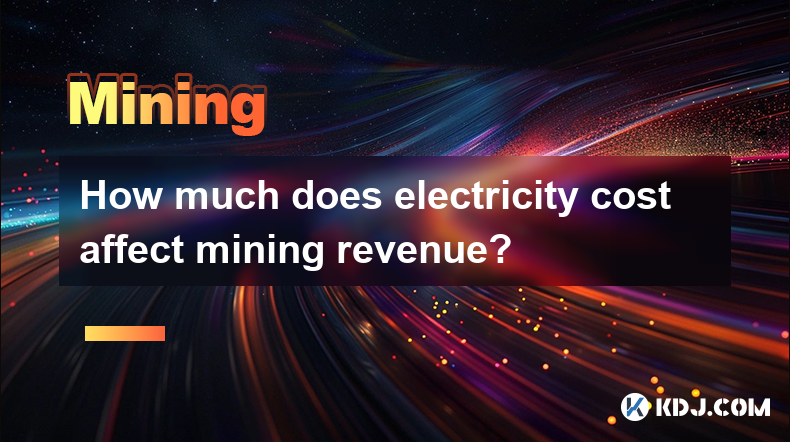
How much does electricity cost affect mining revenue?
Apr 08,2025 at 05:29pm
The cost of electricity plays a crucial role in determining the profitability of cryptocurrency mining. Mining revenue is directly impacted by the expenses incurred in running mining equipment, with electricity costs often being the most significant operational expense. Understanding how electricity costs affect mining revenue is essential for miners lo...
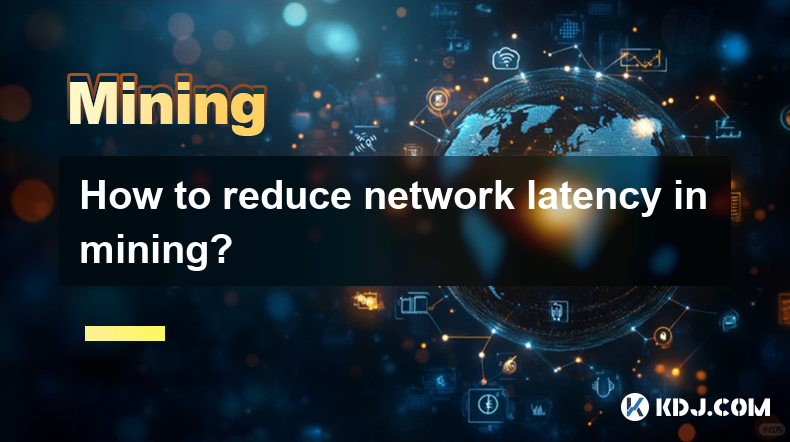
How to reduce network latency in mining?
Apr 09,2025 at 02:28am
Understanding Network Latency in MiningNetwork latency is a critical factor in the world of cryptocurrency mining. It refers to the time it takes for data to travel from its source to its destination across a network. In mining, lower latency can mean the difference between successfully adding a block to the blockchain and missing out on the reward. Red...

What is hashrate fluctuation?
Apr 08,2025 at 08:08pm
Hashrate fluctuation refers to the changes in the total computational power used by miners to process transactions and secure the blockchain network. This metric is crucial in the cryptocurrency world, particularly for networks like Bitcoin, Ethereum, and others that rely on proof-of-work (PoW) consensus mechanisms. Understanding hashrate fluctuation is...

Why does mining require a full node?
Apr 08,2025 at 06:49pm
Mining in the cryptocurrency world is a complex process that involves verifying transactions and adding them to the blockchain. One of the key components required for mining is a full node. But why is a full node necessary for mining? Let's delve into the reasons and explore the intricacies of this requirement. What is a Full Node?A full node is a progr...
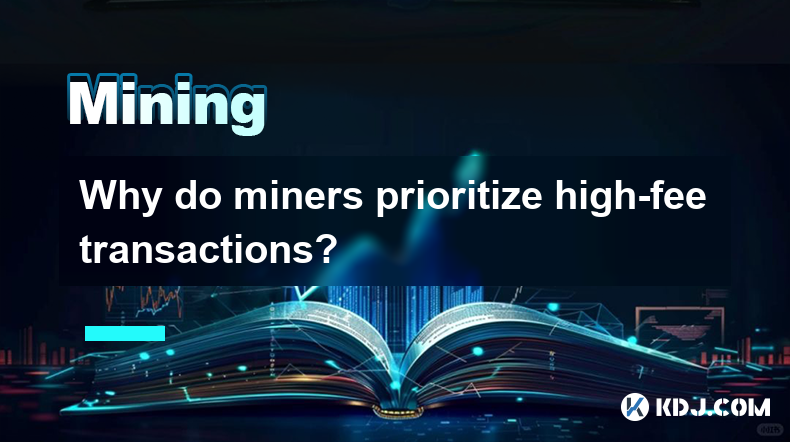
Why do miners prioritize high-fee transactions?
Apr 08,2025 at 05:01pm
Miners in the cryptocurrency ecosystem, particularly in networks like Bitcoin, play a crucial role in validating and adding transactions to the blockchain. One of the key factors that influence their decision-making process is the transaction fee associated with each transaction. Miners prioritize high-fee transactions primarily because these fees direc...

How to prevent mining machines from being hacked?
Apr 08,2025 at 09:00pm
In the world of cryptocurrency, mining machines play a crucial role in securing networks and validating transactions. However, these machines are also prime targets for hackers looking to exploit vulnerabilities for financial gain. Preventing mining machines from being hacked requires a multi-faceted approach that includes robust security measures, regu...

How much does electricity cost affect mining revenue?
Apr 08,2025 at 05:29pm
The cost of electricity plays a crucial role in determining the profitability of cryptocurrency mining. Mining revenue is directly impacted by the expenses incurred in running mining equipment, with electricity costs often being the most significant operational expense. Understanding how electricity costs affect mining revenue is essential for miners lo...

How to reduce network latency in mining?
Apr 09,2025 at 02:28am
Understanding Network Latency in MiningNetwork latency is a critical factor in the world of cryptocurrency mining. It refers to the time it takes for data to travel from its source to its destination across a network. In mining, lower latency can mean the difference between successfully adding a block to the blockchain and missing out on the reward. Red...

What is hashrate fluctuation?
Apr 08,2025 at 08:08pm
Hashrate fluctuation refers to the changes in the total computational power used by miners to process transactions and secure the blockchain network. This metric is crucial in the cryptocurrency world, particularly for networks like Bitcoin, Ethereum, and others that rely on proof-of-work (PoW) consensus mechanisms. Understanding hashrate fluctuation is...

Why does mining require a full node?
Apr 08,2025 at 06:49pm
Mining in the cryptocurrency world is a complex process that involves verifying transactions and adding them to the blockchain. One of the key components required for mining is a full node. But why is a full node necessary for mining? Let's delve into the reasons and explore the intricacies of this requirement. What is a Full Node?A full node is a progr...

Why do miners prioritize high-fee transactions?
Apr 08,2025 at 05:01pm
Miners in the cryptocurrency ecosystem, particularly in networks like Bitcoin, play a crucial role in validating and adding transactions to the blockchain. One of the key factors that influence their decision-making process is the transaction fee associated with each transaction. Miners prioritize high-fee transactions primarily because these fees direc...
See all articles






















































































